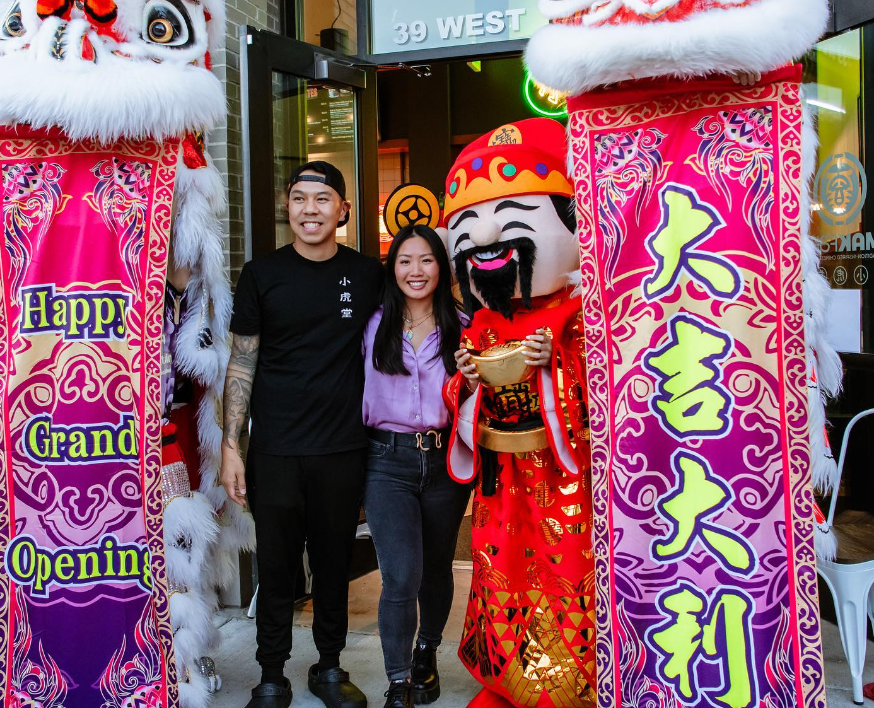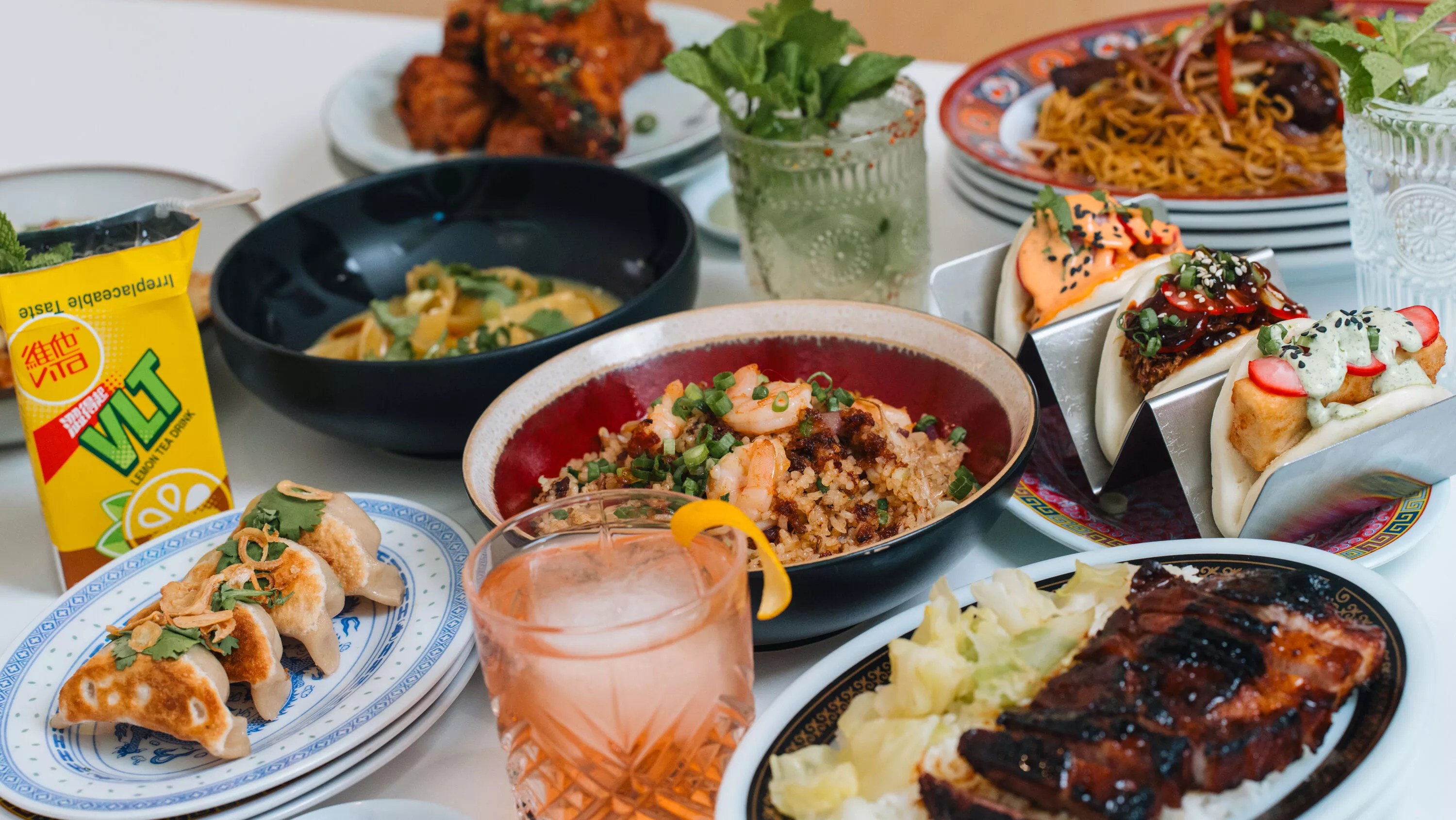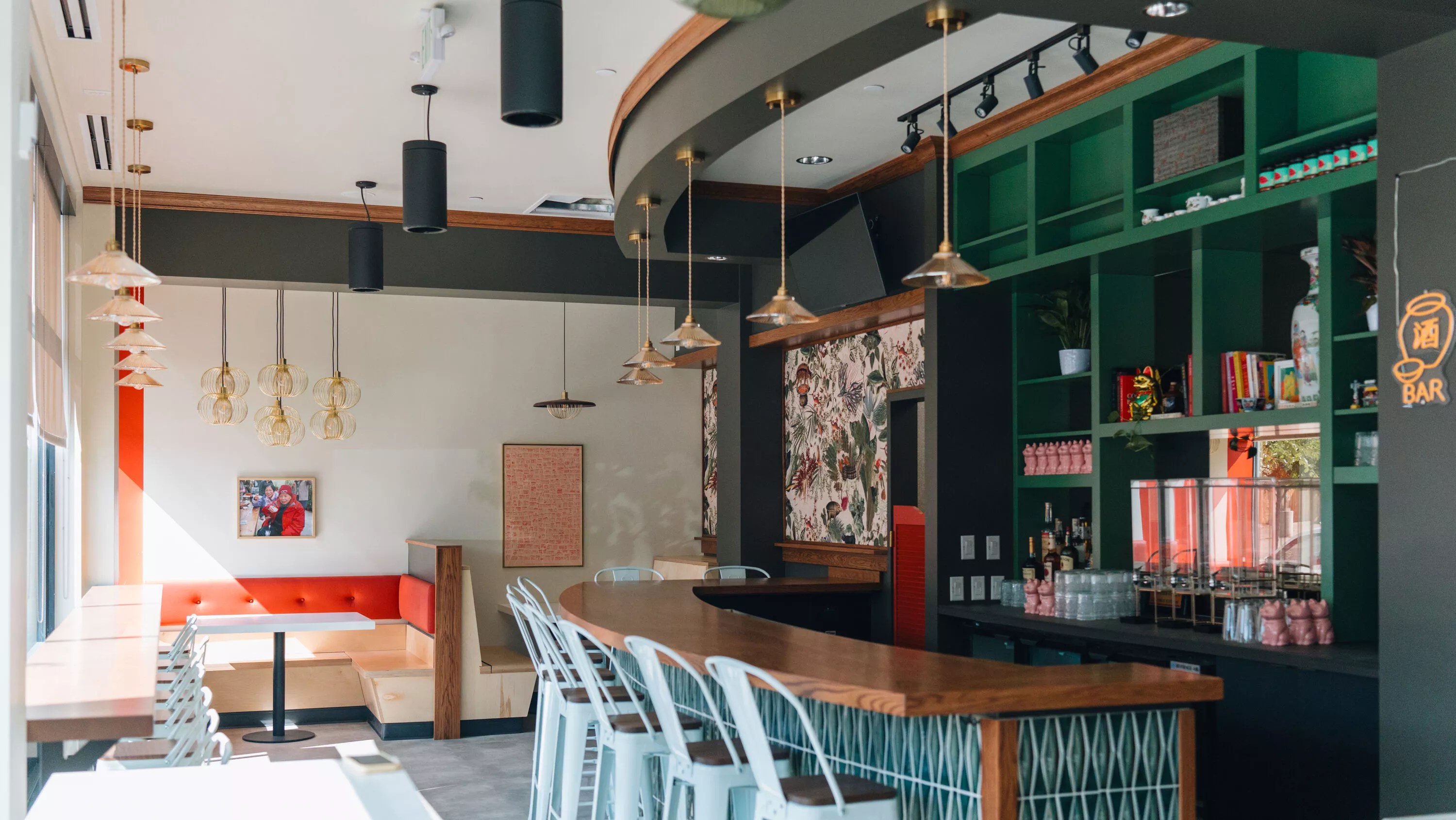
MAKfam

Audio By Carbonatix
A beautiful Art Deco-style poster depicts a young, happy Asian girl wearing a traditional Chinese dress. Like the Morton Salt Girl, she’s holding an umbrella against the rain in one hand and clutching a carton of white powder that is spilling out behind her in the other.
Created by artist Brenda Chi, the poster proudly hangs on a wall at MAKfam, an elevated fast-casual restaurant serving Chinese food inspired by its owners’ Cantonese heritage that opened November 1. But it’s not the poster’s aesthetic that make some do a double take – it’s the caption: “Monosodium glutamate: It’s better with MSG!”
MSG has long been a stigmatized ingredient, hypothesized as a cause of headaches and discomfort, and often associated with Chinese-American restaurants. “Growing up, my parents didn’t use MSG at home. They would actually always say, ‘Oh, don’t go out to eat so much, because there’s a lot of MSG in food, and if you eat too much MSG, it’s not good for you,” recalls Doris Yuen, co-owner and general manager at MAKfam.
Co-owner and head chef (as well as Yuen’s husband) Kenneth Wan had a similar experience: “I’m a restaurant kid through and through. My parents are immigrants from Hong Kong, and they opened the typical Chinese-American hole-in-the-wall,” he explains. They often encountered customers who asked if they used MSG, and “my parents, being non-English speaking immigrants from China, just wanted to make money and appease customers. So we were a place that said we don’t use MSG in our food.”
It wasn’t until Wan moved to New York City to attend culinary school that his attitude toward MSG changed. The acclaimed head chef he worked under at Duckedup, the restaurant at members’ club Ludlow House, encouraged him to use MSG, which many in the hospitality industry consider a standard pantry flavor enhancer similar to salt.

MAKfam owners Kenneth Wan and Doris Yuen celebrating its grand opening.
Lucy Beaugard
“From a back-of-house standpoint, from a cooking standpoint, restaurants treat MSG just like salt or sugar or garlic powder or onion powder,” Wan explains.
Despite being used in restaurants across many cuisines, Yuen is quick to add that a customer would “never go to a pizza restaurant and say, ‘Hey, make sure my pizza doesn’t have MSG in it.’ … I started looking into the history of MSG and realized that it was based on a lot of racist connotations, and always, again, Chinese restaurants. I learned that MSG is extracted from seaweed, and it’s just a flavor enhancer that actually has less sodium than salt.”
MSG is a sodium salt of glutamic acid – it’s a naturally occurring compound found in tomatoes, cheese and soy sauce that creates the umami flavor in those foods. It was originally discovered and identified in 1866 by German chemist Karl Heinrich Ritthausen, then isolated in seaweed and subsequently patented by Japanese professor Kikunae Ikeda (who also coined the term “umami”).
A year later, in 1909, the Suzuki brothers began commercial production of MSG, calling it “Ajinomoto,” or the “essence of taste,” and it quickly made its way into Japanese, Chinese and Vietnamese cuisine. The most common method to produce MSG is via bacterial fermentation, similar to the process used to make yogurt and vinegar.
In 1959, the U.S. Food and Drug Administration classified MSG as “generally recognized as safe.” However in 1968, a letter to the editor signed “Dr. Robert Ho Man Kwok” was published in the New England Journal of Medicine describing discomfort and headaches after eating at Chinese restaurants, calling it “Chinese restaurant syndrome” and pointing to MSG as the reason. (There is an episode of This American Life that digs into the story behind the letter.)
The letter enforced and perpetuated the stereotype of Chinese food being unhealthy, unsanitary and “other.” Soon, many Chinese-American restaurants began self-defensively stating, “We do not use MSG,” despite the fact that from the 1970s to the 1990s, countless studies touting the safety of the ingredient were published by the Federation of American Societies for Experimental Biology Committee; the FDA’s Advisory Committee on Hypersensitivity; the Joint Expert Committee on Food Additives of the United Nations Food and Agriculture Organization and the World Health Organization; and the European Community’s (EC) Scientific Committee for Foods.

Dumplings, noodles, fried rice and more are on the menu at MAKfam.
Jeff Fierberg
When Yuen and Wan opened their first Denver food concept in 2019, Meta Asian Kitchen at Avanti, there was no question that they would use MSG, but the stigma was still internalized. “We were a new business at the time, so I was a little ashamed admitting that we use MSG, because I didn’t want to lose the client base that we have,” says Yuen. “But the more I came to understand MSG and the more I heard Ken talk proudly about using MSG, it made me feel proud about using MSG. It’s a natural ingredient, and it doesn’t deserve all the negative press it’s received all of these years. It makes everything taste much better, so why should I feel ashamed that we use MSG?”
She continues, “When we opened up MAKfam, I said to Ken, I’m going to be very proud and loud that we use MSG.” That meant putting up the MSG Girl poster, naming one of the cocktails MSGin, and politely educating customers who inquire on a weekly basis whether they use MSG.
It’s a lot of churn over a single ingredient out of the hundreds being used in the kitchen. “Yes, we use MSG, but like with any other flavoring agent, we’re not throwing it in everything and covering it in copious amounts,” Wan says.
On September 25, Yuen posted a picture of the MSG Girl poster on Instagram. The feedback was mostly positive, but there were a few DMs sent to the restaurant by people who criticized it for using the ingredient and promising never to visit. But never did Yuen feel the desire to take the post down. “If we can change one person’s mind about MSG, then we’ve done our job,” she says. “We’re trying to vindicate this ingredient. We’re not trying to start any drama with anyone.”
Nevertheless, drama ensued. On December 5, the influencer account @catchcarri posted a video of MAKfam, showing off the decor, drinks and food, eliciting many emoji heart reactions and gushy comments. But one commenter wrote, “Isn’t that the restaurant that serves MSG?”

Doris Yuen describes MAKfam as a “fine casual” restaurant.
Jeff Fierberg
MAKfam’s PR representative and the restaurant’s account politely replied, dispelling the stigma around MSG and explaining its association to xenophobic attitudes toward Chinese people. Afterward, the original commenter replied with gratitude for the explanation, but also dismissal that preconceptions about MSG needed to be tied to racism. At one point they wrote, “It is a big stretch. Why would people eat ‘Chinese food’ if they were also racist against Chinese food. Ridiculous. MSG is unhealthy and not necessary in food.” (The original commenter appears to have taken everything down since, the restaurant notes.)
“It’s really demeaning to say to someone that [their] experience doesn’t mean anything,” Wan says of the interaction. “Like, ‘It’s just a table condiment, how racist can it be?’ I mean, you didn’t grow up in a Chinese restaurant where your parents had to put up signs that say ‘There’s no MSG in our food’ so they can continue to thrive in their business.”
“There’s still a lot of misinformation out there, and there’s still a lot of people who don’t understand the racist past that MSG has and its association with Chinese food,” adds Yuen. “I am tired of answering to people [about MSG, but the misconception] is a problem and is what we’re trying to dispel.”
On the positive side, an overwhelming number of supporters jumped into the discourse, and Yuen and Wan have talked to many customers who fully understand and support what they’re doing. Plus, they note, the day after the Instagram drama was one of the busiest they’ve had.
“We are very proud of the ingredients that we use at MAKfam,” Yuen concludes. “We hope that people who don’t agree with what we do – that’s fine, you don’t have to dine with us. But please don’t attack our business just because you don’t believe in the ingredient that we use.”